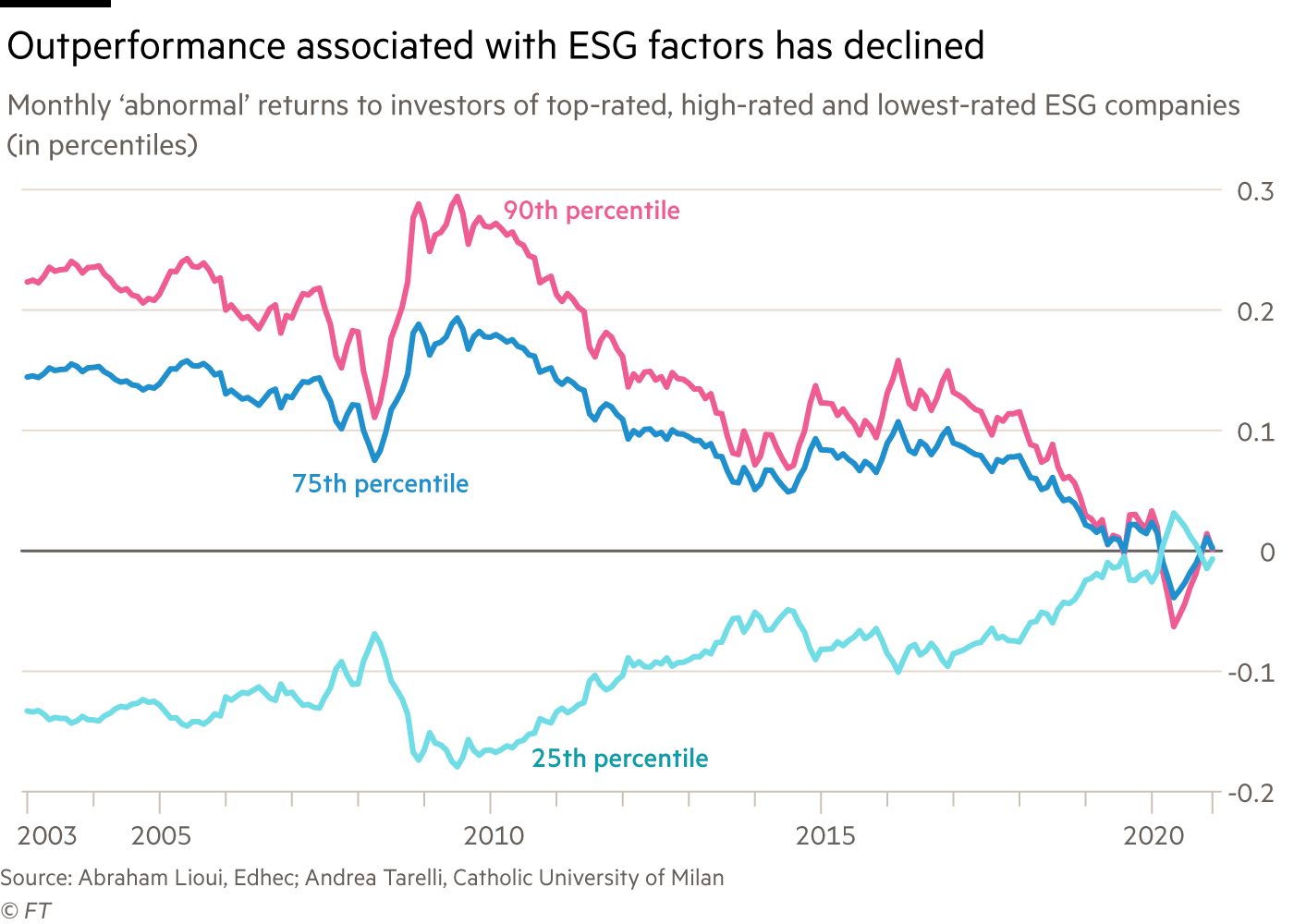ESG investments—or those focused on environmental, social, and governance causes—have been strong performers in recent years. For example, during the depths of the COVID-19 pandemic, sustainable funds outperformed their traditional peer funds and reduced investment risk, according to the Morgan Stanley Institute for Sustainable Investing.
Let’s examine whether the growing popularity of ESG investments will eventually depress returns—and whether that even matters to investors.
Be sure to check our ESG Channel to learn more.
Waning Performance
Large-cap sustainable funds outperformed benchmarks over the past few years. For example, the actively managed Parnassus Core Equity Fund (PRBLX) and the passively managed iShares ESG Aware MSCI USA ETF (ESGU) both outperformed the SPDR S&P 500 ETF (SPY) in 2020—although they’ve had mixed results through 2021.
| Fund | 2018 | 2019 | 2020 |
| Parnassus Core Equity Fund (PRBLX) | -0.18% | 30.69% | 21.19% |
| iShares ESG Aware MSCI USA ETF (ESGU) | -4.22% | 31.71% | 22.54% |
| SPDR S&P 500 ETF (SPY) | -4.58% | 31.22% | 18.22% |
Source: Morningstar
A new study by Abraham Lioui of Edhec Business School suggests that the ESG market could become a victim of its success. As popularity grows, market efficiencies are likely to take over and drive down investment alpha. And that’s not necessarily a bad thing—the growing popularity is a sign of maturity for the nascent market.

That said, the authors add that ESG funds offer exposure to existing well-documented factors that favor high-quality stocks, meaning that these investments could continue to outperform over time. Investors may have to wait for a couple more years of data to separate the actual trends from the noise, given that the outperformance has lasted for years.
Does It Matter?
Most ESG-focused investors subscribe to the idea of a triple bottom line—or looking at social, environmental, and financial returns. In other words, they may be willing to accept lower financial returns as long as there are attractive social and environmental returns. However, the measurement of these returns is still in a state of flux.
The lack of standards is an oft-cited barrier to sustainable investing. Fortunately, these standards are emerging, and it’s becoming easier to measure the impact of ESG factors. And, at the same time, regulators are pushing companies to be more transparent about ESG risk factors, potentially increasing the risk premium of non-ESG investments.
Some behavioral studies even suggest that investors are not only willing to trade off financial outcomes for social outcomes but desire these trade-offs. Like giving money to charity, accepting lower financial returns may be seen as a form of altruism for some investors, further decreasing the importance of financial performance to ESG adoption rates.
The current data seem to support these notions. Despite relatively modest alpha in 2021, ESG investments had record net inflows during the first half of the year, according to ETFGI, an independent research and consultancy. In aggregate, the firm found ESG assets rose 51.6% during the first half from $193 billion in 2020 to $293 billion by June 30, 2021.
Choosing ESG Funds
Investors have a growing number of options when looking at ESG mutual funds and exchange-traded funds (ETFs). In addition, a growing number of robo-advisors and conventional financial advisors support ESG investment styles, making it easy for anyone to target a triple bottom line that goes beyond just financial returns.
Since there is a lack of industry-wide standards, investors should carefully review the prospectuses of ESG investments to ensure that they align with their personal goals. For example, some ESG funds are exclusionary in nature, meaning they only avoid things like “sin stocks,” whereas others are inclusionary, meaning they seek out companies that make a difference.
As with any mutual fund or ETF, investors should also be aware of the expenses, portfolio turnover, and other attributes associated with these funds. The growing popularity of ESG funds have reduced expense ratios across the board, helping to improve returns, while actively managed funds may be preferred in some cases to meet ESG goals.
Don’t forget to explore our list of ESG Equity Funds.
The Bottom Line
ESG investments have been strong performers over the past few years, but it’s unclear how much that’s driving adoption. Unlike conventional investments, investors that purchase sustainable investments may be interested in more than just financial returns. Thus, even if ESG outperformance dries up, the industry could still see strong growth.
Check out News page to get regular updates on mutual fund and ETF performance and trends.





